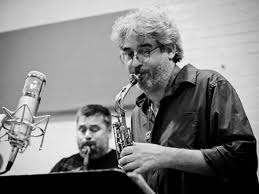Alto saxophonist and staunchly original composer-bandleader Tim Berne’s new album — his 41st, but first on a label as internationally prominent as ECM since he put out two scorchers for Columbia in the mid ’80s — has the strange title, Snakeoil, meaning b.s., originating in the sale of quack medicines. This must be part of Berne’s self-deprecating, somewhat detached and perhaps sardonic temperament. But then he’s always been a bit of a lone wolf, going his own way, as I write in my newest column in CityArts-New York, just before he embarks on a rare 11-city US and 9-city European tour (starting at Regatta Bar, Boston on Feb 16, the Rubin Museum of Himalayan Art Feb 17).
There’s nothing fraudulent about Berne, it must be said from the start, any of his past music or this particular album, which is another (his 41st) uncompromising demonstration of what musicians come up with when they think for themselves about beauty — which seems to be his chief concern. Berne’s tone on alto, to begin with, is exacting while ranging moodily from plaintive clarity to steely assertiveness. His compositions are not slick or glib — they are rather long, multi-dimensional and demand genuine engagement of all the musicians involved, rewarding most those listeners who pay full attention, free of suppositions, to the sheerly sensual fluctations of of sound and the players’ interactions. With no bass, rigorous-as-chamber-quartet attention to detail and the patented ECM sonic treatment delivering the tonal richness all the instruments (besides Berne’s sax, Oscar Noriega’s clarinet and bass clarinet, Matt Mitchell’s grand piano and Ches Smiths’ traps and other percussion), the composer’s concept and ensemble’s realization are presented with utmost honesty.
This is how the music is meant to sound, you become convinced, how the musicians hear it in their minds, so pressing they have to get it into the air (and they’re enormously lucky to have it so documented). Their music, for all its obvious framework, also seems to spring from them spontaneously – Noriega’s clarinet, in particular, has episodes of venturing forth all but unaccompanied, toeing a thin line of naked uncertainty that lures the ear along in suspense ’til he connects (gasp! — how?) with a resolutely structured (though still far from conventional) part of the song.
Berne’s efforts have always been for serious contemplation. I don’t know of any of it you (or at least I) could dance to, but the alternative to rockin’ rhythms and ecstatic riffs has its compensations. Follow these pieces and you slip through dark woods, roam the lip of a cliff looking down a ravine, removed from any referents to easy pop culture, the way things dully always are, the usually inescapable context of urban life.
Snakeoil has a Nordic quality, as do many ECM records — meaning they’re more cooly incisive than hot and heedless. Well, over the course of a 35+ year career, Berne has evaded the traps of predictablity, being tamed or de-toothed, and that’s an achievement to be admired, in part because it’s so hard for musicians coming up today to emulate. On the other hand, Berne is not now and has never been withdrawn, musically. He plays well with others: Bill Frisell, Hank Roberts, Herb Robertson, Tom Rainey, Craig Taborn, Michael Formanek, David Torn and Chris Speed have been among his most reliable collaborators, and represent an enlighted circle. He also gets them to play well with him.
That’s a rare strength for a lone wolf, but then you’ve got to figure that a survivor of 35+ years independence in an art form already as out in the territories as jazz is by Darwinian precepts and definition an alpha. He doesn’t bite, but he suffers no foolishness either. It’s tough being an outsider, trying to get heard. But dig, Snakeoil aint’ hardly about selling.

